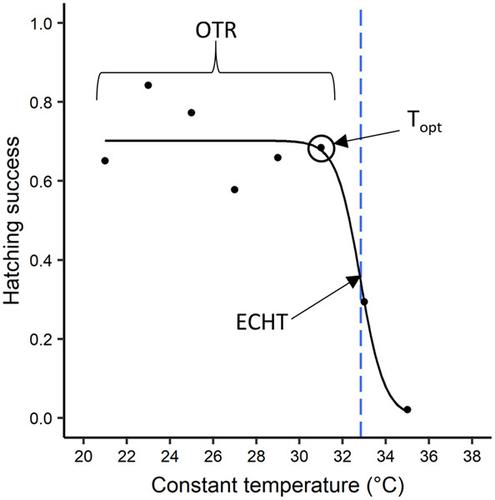当前位置:
X-MOL 学术
›
J. Exp. Zool. Part A
›
论文详情
Our official English website, www.x-mol.net, welcomes your
feedback! (Note: you will need to create a separate account there.)
Heat tolerance of reptile embryos: Current knowledge, methodological considerations, and future directions
Journal of Experimental Zoology Part A ( IF 1.9 ) Pub Date : 2020-08-05 , DOI: 10.1002/jez.2402 Joshua M Hall 1 , Bao-Jun Sun 2
Journal of Experimental Zoology Part A ( IF 1.9 ) Pub Date : 2020-08-05 , DOI: 10.1002/jez.2402 Joshua M Hall 1 , Bao-Jun Sun 2
Affiliation

|
Aspects of global change result in warming temperatures that threaten biodiversity across the planet. Eggs of non‐avian, oviparous reptiles (henceforth “reptiles”) are particularly vulnerable to warming due to a lack of parental care during incubation and limited ability to behaviorally thermoregulate. Because warming temperatures will cause increases in both mean and variance of nest temperatures, it is crucial to consider embryo responses to both chronic and acute heat stress. Although many studies have considered embryo survival across constant incubation temperatures (i.e., chronic stress) and in response to brief exposure to extreme temperatures (i.e., acute stress), there are no standard metrics or terminology for determining heat stress of embryos. This impedes comparisons across studies and species and hinders our ability to predict how species will respond to global change. In this review, we compare various methods that have been used to assess embryonic heat tolerance in reptiles and provide new terminology and metrics for quantifying embryo responses to both chronic and acute heat stress. We apply these recommendations to data from the literature to assess chronic heat tolerance in 16 squamates, 16 turtles, five crocodilians, and the tuatara and acute heat tolerance for nine squamates and one turtle. Our results indicate that there is relatively large variation in chronic and acute heat tolerance across species, and we outline directions for future research, calling for more studies that assess embryo responses to acute thermal stress, integrate embryo responses to chronic and acute temperatures in predictive models, and identify mechanisms that determine heat tolerance.
中文翻译:

爬行动物胚胎的耐热性:当前的知识,方法上的考虑和未来的方向
全球变化的各个方面导致温度升高,威胁到地球上的生物多样性。非禽类卵生爬行动物(以下简称“爬行动物”)的卵特别容易变暖,原因是孵化过程中缺乏父母的照料,行为温度调节能力有限。由于温度升高会导致巢温的平均值和方差增加,因此考虑胚胎对慢性和急性热应激的反应至关重要。尽管许多研究已经考虑了在恒定孵育温度(即慢性应激)下以及在短暂暴露于极端温度(即急性应激)下的胚胎存活率,但尚无用于确定胚胎热应激的标准指标或术语。这阻碍了研究与物种之间的比较,并阻碍了我们预测物种将如何响应全球变化的能力。在这篇综述中,我们比较了已用于评估爬行动物胚胎耐热性的各种方法,并提供了新的术语和度量标准来量化胚胎对慢性和急性热应激的反应。我们将这些建议应用到文献数据中,以评估16个鳞茎,16个海龟,5个鳄鱼和5个鳄鱼的tuatara的慢性耐热性和急性耐热性。我们的结果表明,不同物种在慢性和急性热耐受性方面存在较大差异,我们概述了未来研究的方向,呼吁开展更多研究来评估胚胎对急性热应激的反应,
更新日期:2020-08-05
中文翻译:

爬行动物胚胎的耐热性:当前的知识,方法上的考虑和未来的方向
全球变化的各个方面导致温度升高,威胁到地球上的生物多样性。非禽类卵生爬行动物(以下简称“爬行动物”)的卵特别容易变暖,原因是孵化过程中缺乏父母的照料,行为温度调节能力有限。由于温度升高会导致巢温的平均值和方差增加,因此考虑胚胎对慢性和急性热应激的反应至关重要。尽管许多研究已经考虑了在恒定孵育温度(即慢性应激)下以及在短暂暴露于极端温度(即急性应激)下的胚胎存活率,但尚无用于确定胚胎热应激的标准指标或术语。这阻碍了研究与物种之间的比较,并阻碍了我们预测物种将如何响应全球变化的能力。在这篇综述中,我们比较了已用于评估爬行动物胚胎耐热性的各种方法,并提供了新的术语和度量标准来量化胚胎对慢性和急性热应激的反应。我们将这些建议应用到文献数据中,以评估16个鳞茎,16个海龟,5个鳄鱼和5个鳄鱼的tuatara的慢性耐热性和急性耐热性。我们的结果表明,不同物种在慢性和急性热耐受性方面存在较大差异,我们概述了未来研究的方向,呼吁开展更多研究来评估胚胎对急性热应激的反应,









































 京公网安备 11010802027423号
京公网安备 11010802027423号